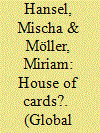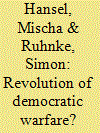|
|
|
Sort Order |
|
|
|
Items / Page
|
|
|
|
|
|
|
| Srl | Item |
| 1 |
ID:
119250


|
|
|
|
|
| Publication |
2013.
|
| Summary/Abstract |
Is arms control becoming irrelevant? This analysis offers a new way of testing the decline of arms control. Rather than focusing on foreign policy outputs and international outcomes, this analysis examines perceptions of security policy decision makers and opinion leaders through their references to arms control. Salience and framing analysis are used to evaluate the marginalization of arms control in political communication. Empirically, the article examines selected American media coverage, research institute publications, and the Congressional Record. This research confirms a dwindling number of references to the concept of arms control over the last two decades. This trend is not explained by the emergence of new technological issues, nor does it follow the chronological pattern of actual arms control successes and failures. Rather it hints at a more fundamental transformation of political thought.
|
|
|
|
|
|
|
|
|
|
|
|
|
|
|
|
| 2 |
ID:
131344


|
|
|
|
|
| Publication |
2014.
|
| Summary/Abstract |
India has always been a major troop contributor to UN peacekeeping missions. In recent years, however, the benefits of these efforts have been increasingly questioned by some of the country's strategic elites, as are some of the guiding norms of contemporary peace operations. This article scrutinizes the contemporary and historical plausibility of both ideational and materialistic explanations of India's comprehensive peacekeeping engagement. Against this backdrop, it provides an estimation of the likelihood of a future Indian retreat from these efforts. Our conclusions are neither reassuring nor alarmist. Status and economic considerations, normative disagreements, and growing frustration with the stalemate of UN reforms all complicate India's peacekeeping policies. Neither of them, however, unambiguously hints at a complete withdrawal.
|
|
|
|
|
|
|
|
|
|
|
|
|
|
|
|
| 3 |
ID:
164407


|
|
|
|
|
| Summary/Abstract |
This article suggests studying special relationships in international politics from an ontological security perspective. It argues that conceptualising the partners to special relationships as ontological security seekers provides a promising theoretical angle to address gaps in our understanding of three important dimensions of such relations: their emergence and stability; the processes and practices of maintaining them; and the power relations within special relations. The article illustrates its theoretical argument in a case study on the German-Israeli relationship. The close partnership between the two countries that has developed since the Holocaust ranks as one of the most remarkable examples of special relationships in the international arena. We argue that foregrounding the ontological security that the special relationship provides, in particular for Germany, sheds important new light on how German-Israeli relations have developed. Specifically, we hold that Germany’s ontological security needs were already an important driver in establishing the relationship and have been a key stabiliser of it ever since; that the ontological security perspective can make sense of three interrelated practices of maintaining the ‘specialness’ of the relationship; and that the asymmetries between the ontological security needs of the two partners help account for Israel’s political leverage in the relationship.
|
|
|
|
|
|
|
|
|
|
|
|
|
|
|
|
| 4 |
ID:
155772


|
|
|
|
|
| Summary/Abstract |
Armament policies are determined by domestic rather than international politics according to liberal IR perspectives. More specifically, military transformation processes in democratic countries are understood as being informed by the political need to limit the number of casualties during military operations. Consequently, liberal scholars assume a distinct democratic eagerness to resort to precision-guided munitions, drones, or even cyber attacks. Our analysis challenges this explanation of democratic armament policies. We evaluate the timing and programmatic choices of armament policies of 33 countries, democratic and non-democratic, combining different indicators of information technology procurement and usage by national militaries. Based on this data, countries are categorized into Revolution in Military Affairs leaders, uppers, followers, stragglers, entrants, and non-participants. Finally, we test the explanatory power of two competing independent variables, representing casualty shyness versus capability-based explanations of military transformation processes. Our results show that realist assumptions yield strong correlations, while liberal assumptions do not produce statistically significant results.
|
|
|
|
|
|
|
|
|
|
|
|
|
|
|
|
| 5 |
ID:
096162


|
|
|
|
|
|
|
|